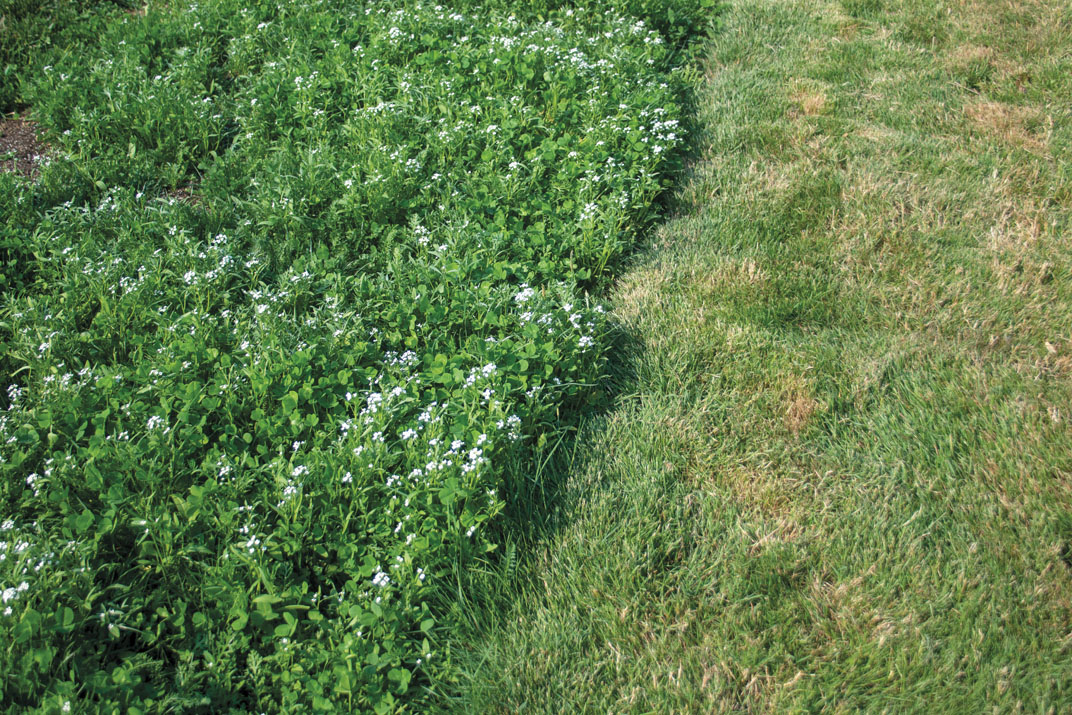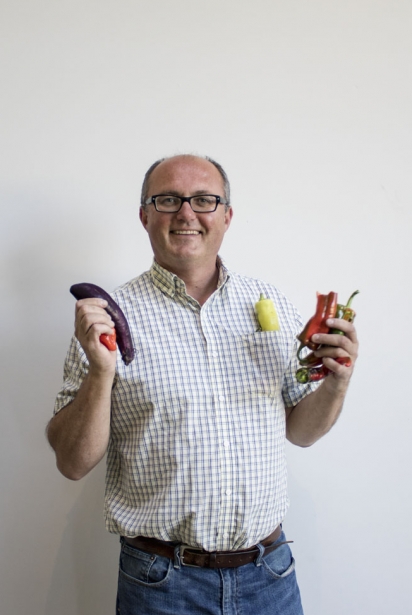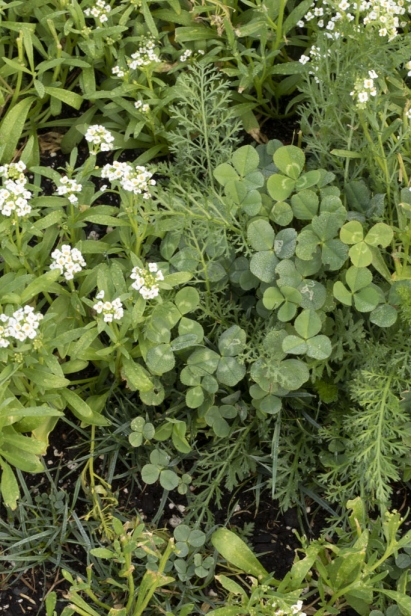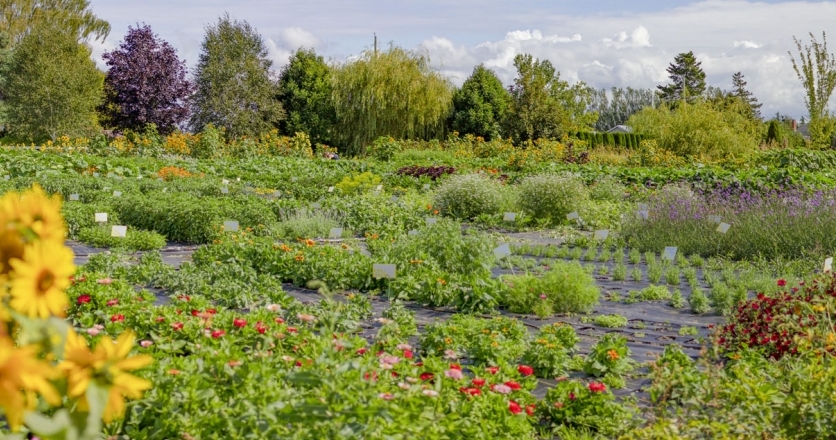Sow an Alternate Lawn
For decades, lawns have been considered a symbol of prosperity and neighbourhood charm: indispensable blankets of soft, green grass surrounding one’s suburban single-family house and bordered by other identical lawns and houses. North Americans obsess over their lawns, nurturing them, sculpting them, freeing them of unsightly dandelions and clovers and fretting when the dog days of summer turn them brown. And for what? These ubiquitous patches of grass do little to help the environment and gobble up precious water and fertilizer. But it appears that the reign of perfectly manicured lawns may finally be coming to an end. Companies such as West Coast Seeds offer lawn alternatives as hardworking as they are beautiful, supporting pollinators and helping the environment.
Alex Augustyniak is the general manager of West Coast Seeds. Based in Delta, the company is committed to helping repair the world through ethical growing, untreated and organic seeds and strong community connections. According to Augustyniak, we ought to be putting our green spaces to much better use: “We should grow food in our yards. Forget about the 100-mile diets, we could have 100-foot diets.” And for those who would like a lawn that they can feel proud of, beyond esthetics alone, the pollinator lawn blends are the perfect solution to bring more diversity to your yard.
“People and landscapers have been trying to kill clover for over 50 years, but we’re bringing it back,” Augustyniak explains. “When it goes to flower, it is wonderful for bees. It also sequesters nitrogen from the air into the soil, supplying the earth with nutrients and making it a perfect cover crop, such as between rows of corn.” Micro-clover is especially prized, as it changes and adapts to its growing environment, becoming smaller and denser with more mowing. This makes it more like traditional grass. Micro-clover is available as an alternative lawn option on its own, and is also mixed into other blends.
West Coast Seeds' Bee Turf blend, for instance, is a mix of clover and wildflowers, developed in partnership with the City of Richmond with the goal of increasing habitat and food for pollinators in urban areas. “Supporting pollinators means supporting the production of food, and indeed supporting all life,” Augustyniak says. “Everything we select at West Coast Seeds is good for pollinators: bees, butterflies or birds.” He explains that biodiversity is crucial for avoiding the extremes of monoculture, with which we become vulnerable to threats of pests, disease and extreme weather. More varieties mean greater resiliency, as we’re less reliant on any one crop. Of course, this is even more important with our changing, unpredictable climate.
While many of the blends help deter the troublesome chafer beetle, one is specific for this purpose. The Chafer beetleresistant blend is a special mix of micro-clover and tall fescue that grows a green, resilient lawn without the “thatch” that the beetles use to lay their eggs.
Several other lawn blends exist, each with a special purpose. Some can be kept short, not unlike a conventional manicured lawn, and some look lovely taller for a “natural pasture” look. No matter what the blend, all the options require far less water and fertilizer and do better in drought situations, Augustyniak says. But West Coast Seeds doesn’t focus solely on lawns. It has been providing customers with untreated seeds suitable for organic growing of all varieties since its infancy in 1983. The founder, Mary Ballon, wanted to find higher-quality seeds that would thrive in B.C.'s climate than those that had been available to home gardeners. She joined forces with farmer Steve Solomon and West Coast Seeds was born. Owned and run by the Diamond Family since 2014, it now offers more than 1,000 varieties of untreated, organic and non-GMO seeds, including many heritage and heirloom varieties.
Augustyniak grew up on his family's farm in Ontario, and as he says, he has been "growing food and animals since he was born." He champions open pollination and hybrid methods at West Coast Seeds, which work in harmony with nature. Open pollination, for example occurs when plants are produced by crossing two “parents” of the same variety, which leads to offspring that’s the same as the parents. “It evolves on its own after you plant it,” he explains. “It learns what the climate is like and keeps on going.” Gardeners find that these seeds are easy to save and result in reliable characteristics.
And the innovation is far from over. “We’re constantly trialing things and contracting farmers to try our seeds,” Augustyniak says. It’s a two-way relationship, with the West Coast Seeds team learning from the famers and vice versa. They also test seeds for the All-America Selections program, an independent non-profit organization that was founded in 1932 to test varieties for home gardeners. The research is endless, as the team works to teach others how to grow food in locally year-round and cultivates a myriad of community connections.
The community programs Augustyniak lists are numerous and impressive. Through their school fundraising programs, for example, students sell donated seeds to raise money for their causes. West Coast Seeds also donates seeds that go unsold at gardening centres to charities worldwide. The company’s donations reach as far as Nepal, where the seeds proved especially helpful after the 2015 earthquake. Closer to home, seeds are donated to organizations such as the Richmond Sharing Farm (where volunteers grow food for families in need), the University of British Columbia's botanical garden (which, in turn, donates produce to soup kitchens and food banks) and Kwantlen Polytechnic University’s Farm School.
Having green space surrounding our homes is a lovely thing and North Americans don't need to break off their affair with lawns altogether. As West Coast Seeds shows us, it just takes a bit of re-imagining to ensure our lawns are beautiful and sustainable.
West Coast Seeds Retail Store
4930A Elliott St, Delta, B.C.
West Coast Seeds Warehouse (location of seed trials and demonstration gardens)
5300 34B Ave., Delta, B.C.
westcoastseeds.com | 604.952.8820 | @westcoastseeds








